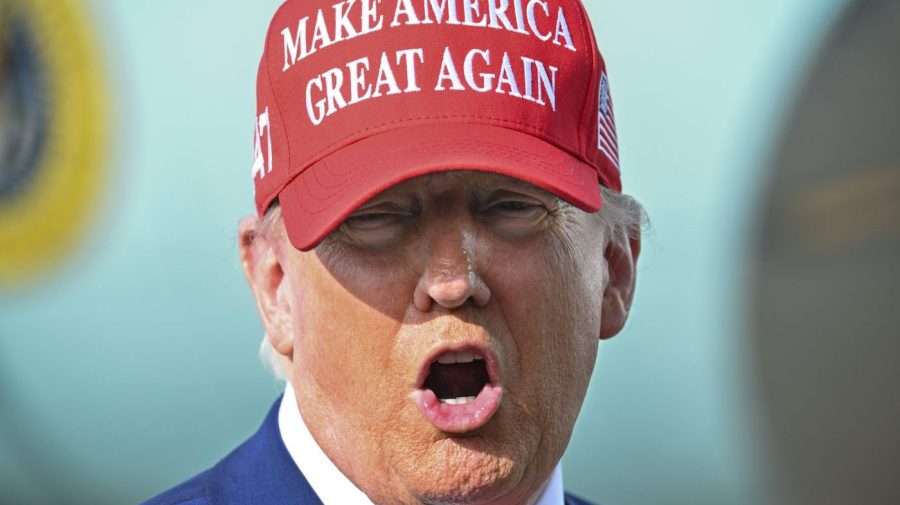
It needs to be stated right off the bat that CBS bungled last fall’s “60 Minutes” interview with Kamala Harris. Having said that, there is no rationale for CBS to continue its cloddish handling of the matter by abandoning fundamental principles of journalistic independence.
A key issue in the minds of many voters was whether presidential contender Harris, then Joe Biden’s vice president, could speak coherently and answer tough questions in an interview setting. Up until the extended interview with CBS’s Bill Whitaker on “60 Minutes” in October, Harris had largely ducked media interrogation, sticking instead to canned stump speeches and soft gab-fests with the likes of Oprah Winfrey. CBS owed it to the electorate to broadcast the Whitaker-Harris interview in its entirety.
The very second CBS decided to edit Harris’s rambling rhetoric, it opened itself up to criticism. CBS tried to defend itself, explaining that editing the Harris interview was just standard practice for clarity and succinctness. That justification makes sense in the normal course of broadcast editing, but not so much when the presidency is on the line. CBS could well have adjusted the timing of its Sunday night primetime to air the entire, unedited interview. Heck, NFL football games run long on many Sunday afternoons, and CBS just adjusts its primetime schedule accordingly.
Public criticism was only part of the fallout from the CBS blunder. The Center for American Rights filed a complaint to the Federal Communications Commission claiming “significant and intentional news distortion,” and the FCC has now opened a formal proceeding to investigate. As might be expected, Donald Trump filed a $10 billion lawsuit against CBS alleging election interference and has since amended the suit to seek $20 billion.
The entire hassle could have been avoided, had the interview been aired in its entirety in the first place. CBS could have short-circuited this lengthy handwringing by promptly releasing the unedited version Oct. 8, when the criticism emerged.
Now CBS has inexplicably caved to mounting pressure and released the “60 Minutes” Harris video and transcript, thus surrendering its earlier argument that this was all about journalistic editing and discretion — so much for standing on independence in journalism and a free press.
Journalists make editorial decisions every time they produce a political story; that fits cleanly within the prerogatives of a free press. Politicians and the FCC don’t need to like it. At the same time, there is always some degree to which news editing — even the most standard — alters reality. Basically, all news coverage of a campaign could be deemed to have elements of election interference, depending on tone, word choices and video edits.
Word is circulating now that CBS might seek an outside settlement in the Trump lawsuit, in part to gain favor with the FCC. That federal agency has a say in whether CBS’s parent media giant, Paramount, can pull off a proposed mega-merger with Skydance. It is sad to think the news network of Edward R. Murrow and Walter Cronkite would even consider selling out its free press principles over such crass corporate practicality.
It seems CBS has become confused recently about the principle of free expression, and as a consequence it can’t stop making headlines about itself. Margaret Brennan recently made an almost unbelievable comment on CBS’s “Face the Nation” about free speech leading to genocide. A “60 Minutes” episode earlier this month included a largely sympathetic and supportive report about Germany’s crackdown against online free speech. Last fall, CBS morning co-host Tony Dokoupil received a public scolding from his bosses for daring to ask challenging questions of a left-leaning political activist.
CBS has some figuring out to do with regards to free expression. It can begin by standing and fighting the Trump lawsuit and not conceding to FCC sanctions. The First Amendment allows for bad decision-making by journalists, incompetent editing and even biased election reporting.
The Roberts Supreme Court has been broadly supportive of free expression rights over the years and almost certainly would rule in support of robust journalistic discretion. If CBS yields, it will make political journalist subject to second-guessing, legal hassles and an overall chilled reportorial climate in which the press is less free.
Jeffrey M. McCall is a media critic and professor of communication at DePauw University. He has worked as a radio news director, a newspaper reporter and as a political media consultant.












